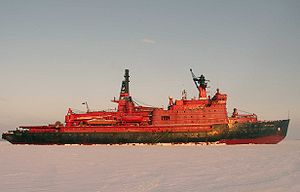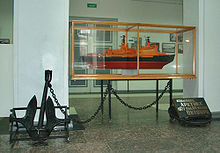- Arktika (icebreaker)
-

Russian nuclear icebreaker ArktikaCareer Operator: Atomflot Port of registry: Murmansk Builder: Baltic Shipyard, Leningrad Launched: 26 December 1972 Completed: 25 April 1975 Out of service: 2008 General characteristics Class and type: Arktika-class icebreaker Displacement: 23,460 tonnes Length: 147.9 m Beam: 29.9 m Draught: 11 m Installed power: 75,000 hp (56,000 kW) Propulsion: 3 Shaft Nuclear Speed: 20.8 knots (38.5 km/h) Crew: 150 NS Arktika is a nuclear powered icebreaker of the Soviet (now Russian) Arktika class. In service since 1975, she was the first surface ship to reach the North Pole, on August 17, 1977.
Arktika was retired for several years, but was repaired in the late 1990s.
On April 9, 2007 a fire broke out on the Arktika. The fire caused minor damage to three cabins and knocked out an electricity-distribution panel. The nuclear reactor was not damaged. There were no injuries. The icebreaker was in the Kara Sea when the blaze erupted, and was sent to Murmansk.[1][2] The ship was officially taken out of service in October 2008.[3]
 Memorial in honor of icebreaker Arctika conquest of the North Pole in 1977 in hall of museum of local lore of the Murmansk region
Memorial in honor of icebreaker Arctika conquest of the North Pole in 1977 in hall of museum of local lore of the Murmansk region
References
- ^ "Fire in nuclear-powered icebreaker", BarentsObserver. Published 2007-04-09.
- ^ Fire on an Atomic Icebreaker, Kommersantъ. Published Apr. 09, 2007
- ^ The last day of a nuclear-powered icebreaker, Barents Observer, 2008-10-02
Coordinates: 75°30′N 35°00′E / 75.5°N 35°E
Categories:- Icebreakers of the Soviet Union
- Icebreakers of Russia
- 1972 ships
- Nuclear-powered icebreakers
- Ships built in the Soviet Union
- Individual ship or boat stubs
Wikimedia Foundation. 2010.
